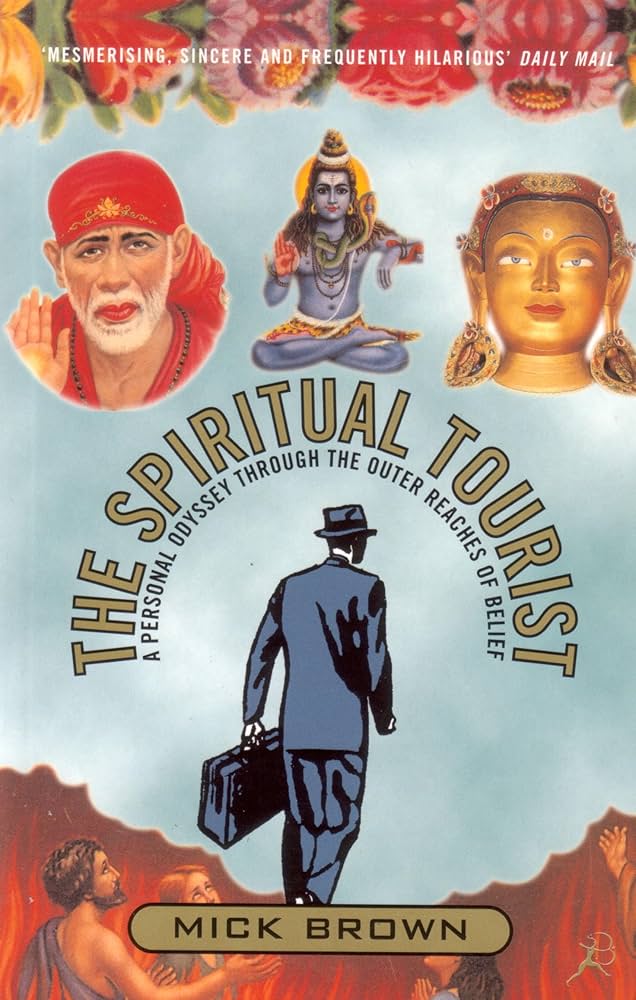Do I find as much comfort in my cynicism as they do their faith? And is it such a bad thing that people seek comfort?
From the age of about 15 I was suspicious about most religious institutions. I couldn't see any evidence of there claims, nor could I see that their followers were either happier or kinder. Alongside that, school had taught me that if I wanted to make a claim, I would need to present sources and also explain how and why those sources might be bias. I was frustrated by this group of people that didn't need to follow this rule. I was almost angry that a lot of people wouldn't accept my word but would accept 'the word of god'. And so I was largely anti-religion. This book is very honest, it digs into the evidence that is lacking. But, as the author meets various gurus and the people that follow them, it's clear despite the lack of evidence, they find great comfort in their words. And so, for me and the author this raises the question, do I find as much comfort in my cynicism as they do their faith? And is it such a bad thing that people seek comfort? Even if the gurus know they are lying, does it offer more calm and comfort than it does harm?
Synopsis
This is a Google Gemini synopsis of The Spiritual Tourist: A Personal Odyssey Through the Outer Reaches of Belief, Mick Brown from 1998.
Here are seven key points from the book:
Chapter 1: The Lure of the Mystical: Brown begins by exploring the pervasive human yearning for the sacred and the various ways people seek spiritual experiences, often through travel and encounters with unusual beliefs.
Chapter 2: Encounters with Sai Baba: A significant part of his journey involves visiting the ashram of the controversial Indian guru Sai Baba, where Brown observes alleged miracles and the devotion of his followers.
Chapter 3: Seeking the Dalai Lama: Brown embarks on a pilgrimage to the Himalayas to meet the Dalai Lama, engaging in discussions about reincarnation and Tibetan Buddhism.
Chapter 4: The Divine Mother in Germany: His travels lead him to Germany, where he encounters a young Indian woman believed by her devotees to be “the Divine Mother,” observing the spiritual experiences of her followers.
Chapter 5: Messiah in London: Brown investigates more unconventional spiritual quests closer to home, including a search for the Messiah in suburban London and examining purported miracles in unexpected places.
Chapter 6: Questioning Belief and Skepticism: Throughout his odyssey, Brown maintains a journalistic yet open-minded approach, often balancing his observations of fervent belief with a healthy degree of scepticism.
Chapter 7: The Essence of the Quest: The book concludes by reflecting on the diverse forms of spiritual searching and the complex nature of faith, belief, and the human need for meaning beyond the material world.
The Spiritual Tourist by Mick Brown is a captivating journalistic account of a personal odyssey through various spiritual movements and figures around the globe. Brown, a seasoned journalist, takes readers on a journey that spans from the foothills of the Himalayas to the backstreets of London, seeking to understand the diverse ways people engage with the sacred. He immerses himself in different spiritual environments, observing the fervent devotion of followers and the compelling presence of their leaders, all while maintaining a balanced and inquiring perspective.
A significant portion of Brown’s exploration is dedicated to his experiences in India, where he witnesses the alleged miracles at the ashram of Sai Baba and engages in profound discussions about reincarnation with the Dalai Lama. His quest also takes him to Germany, to encounter a woman revered as “the Divine Mother,” and even to unexpected corners of suburban London, where he investigates claims of miraculous occurrences and the search for the Messiah. Brown’s narrative is rich with detailed observations and vivid descriptions of the characters and communities he encounters.
Throughout his travels, Brown masterfully navigates the fine line between open-minded inquiry and critical journalistic scrutiny. He approaches each spiritual phenomenon with curiosity and respect for the intensity of belief, yet he also retains a discernible scepticism towards some of the more extraordinary claims. The book is not merely a travelogue but a deeper reflection on the enduring human spiritual quest, the commercialisation of faith, and the often elusive nature of truth in the realm of belief. It offers a candid, witty, and insightful look into the complex tapestry of modern spirituality.

